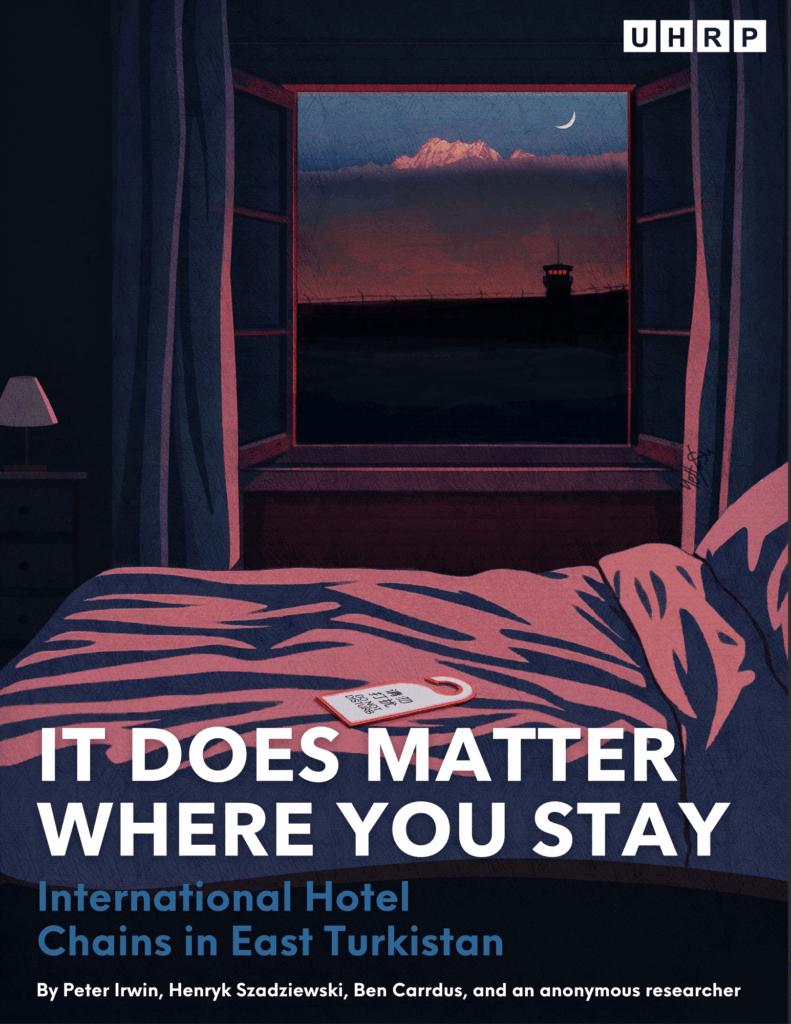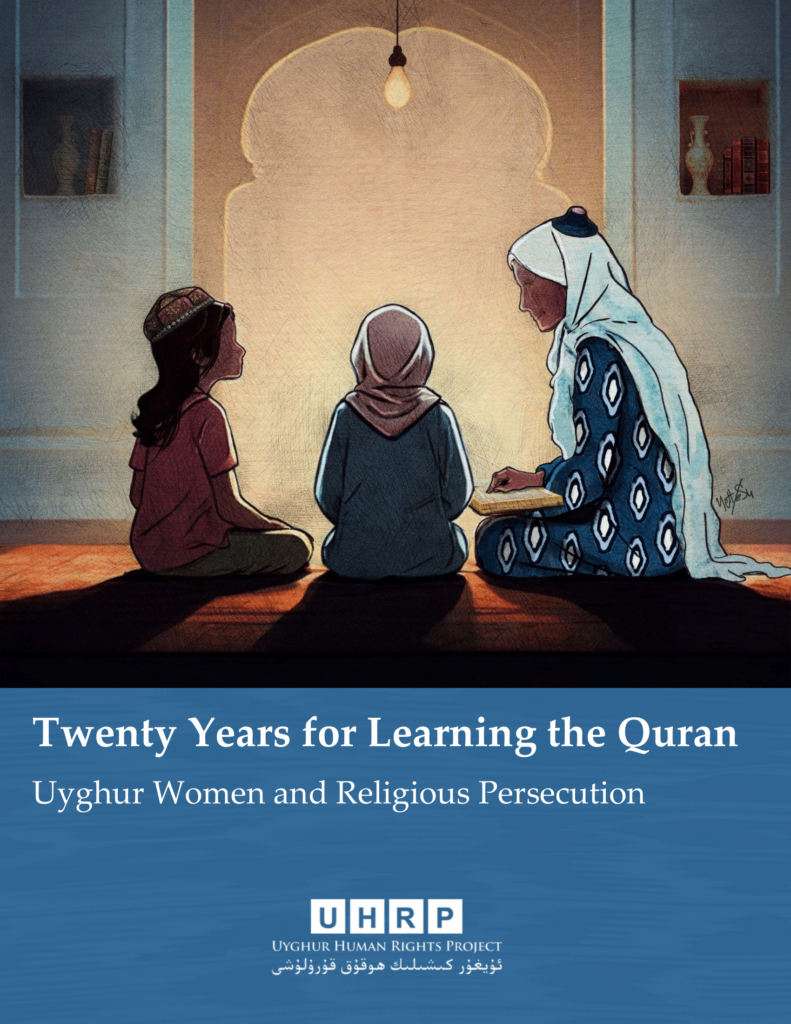A Uyghur Human Rights Project briefing by Elise Anderson. Read our press statement on the report here, and download the full report here.

I. Summary
The Uyghur Human Rights Project is deeply concerned by alarming new evidence that local residents are starving across the Uyghur homeland. Since mid-February, Uyghur-language social media has lit up with disturbing videos, photos, and other information providing evidence that a month-long coronavirus (COVID-19) lockdown is leaving many East Turkistan residents hungry.
Local authorities began placing various parts of the region on lockdown around January 24, after the discovery of at least two cases of COVID-19 in Ürümchi, the economic and political center of the Uyghur Region. Credible news reporting has suggested that residents across the region were given no notice of the quarantine before authorities suddenly ordered them to stay inside their homes. Harshly enforced restrictions have made it nearly impossible for residents to procure food, as well as medicine and other supplies.
As of 2:13 p.m. on February 25, the interactive map “Coronavirus COVID-19 Global Cases by Johns Hopkins CSSE” showed record of 76 confirmed cases of the virus in East Turkistan, with two deaths, 30 recoveries, and 44 existing cases.

II. Evidence
Videos, photos, and writings circulating online are providing credible and highly alarming evidence that authorities’ measures to contain the spread of COVID-19 are creating a hunger crisis in the Uyghur Region. This evidence corroborates claims by members of the Uyghur diaspora that family and friends in the region have sent them messages expressing a fear of starvation thanks to the lockdown. This briefing highlights three pieces of evidence:
I. Blog post: “Xinjiang: a place you can’t leave once you’re here”
This cleverly titled Chinese-language blog post, which uses the pun “a place you can’t leave” to sarcastically comment on the new restrictions on movement in the Uyghur Region, was originally published on what appears to be a personal platform called “Egg FM” by an author with the pseudonymous handle “Chicken brother classmate.” The post attempts to give a comprehensive overview of the coronavirus situation in the region and includes photographs of neighborhood-level (shequ) officials in Ghulja (Yining) pasting pre-printed papers over the doors of private homes under their jurisdiction. These seals will reveal whether anyone has gone outside without permission. The photos lend credence to other sources that have claimed local authorities have taken various measures to lock people in their homes and/or confine them to their neighborhoods.
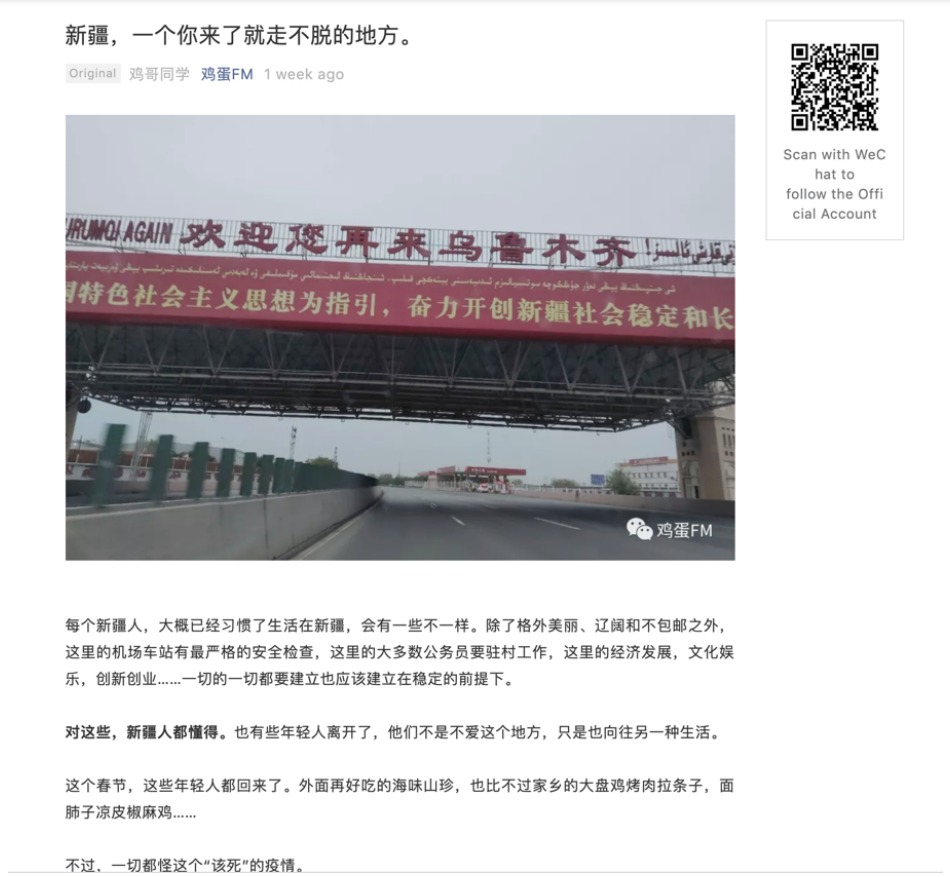
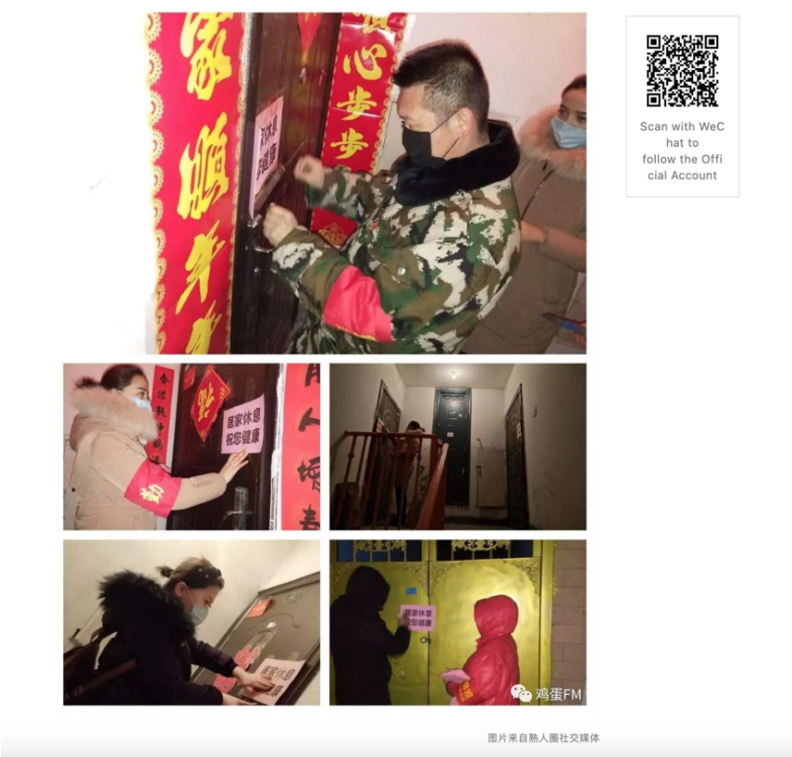
Analysis
Place of origin: Collates information from various places and sources.
Time of creation: Some time on or before February 17, 2020. A timestamp at the bottom of the post indicates that it was last updated on the same date.
Authentication: Language on the printed seals tracks typical government phraseology and style. Our analysis of the photos reveals no earmarks of digital alteration. Other photos posted on social media show seals printed with similar messages in multiple languages, including the Arabic-script Uyghur and Kazakh used in the Uyghur Region.
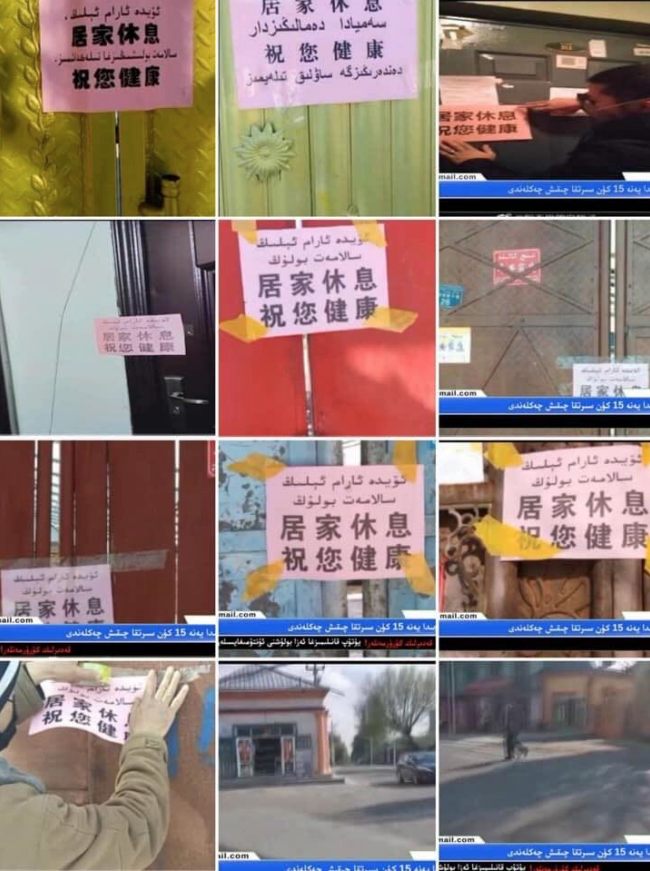
2. Video: “Three people are starving in my house”
A particularly disturbing video shows a young Uyghur man screaming “I’m starving. I’m starving. My wife and children are starving. Three people are starving in my house” at several officials who are filming him. The video further depicts the man banging his head into a pole and on the ground as he continues to scream things like “Do you want to kill me? Just kill me then” at the authorities who are filming him.
Analysis
Place of origin: Likely Ghulja, based on architectural style and the speaker’s accent.
Time of creation: Approximately Thursday, February 20, 2020. The video spread widely among members of the Uyghur diaspora starting that evening in the U.S.
Source: Likely recorded on a private telephone and distributed via Weibo.
Authentication: The accent of the speaker was confirmed by multiple native speakers of Uyghur who were raised in or lived in Ghulja. Details in the natural and built environment are consistent with typical streetscapes in Ghulja, including the use of light blue on the walls and roofs of residential buildings. If the video was filmed in Ghulja, it is unlikely that the video was created unless the man’s desperation was genuine. Both the man on camera, and the person filming, took great risks, exposing themselves to potential punishment by authorities both for breaking quarantine orders and for using social media to circulate messages. Circulating unauthorized messages is punishable under new Coronavirus-related regulations issued by Xinjiang’s top court, prohibiting “spreading rumors.”
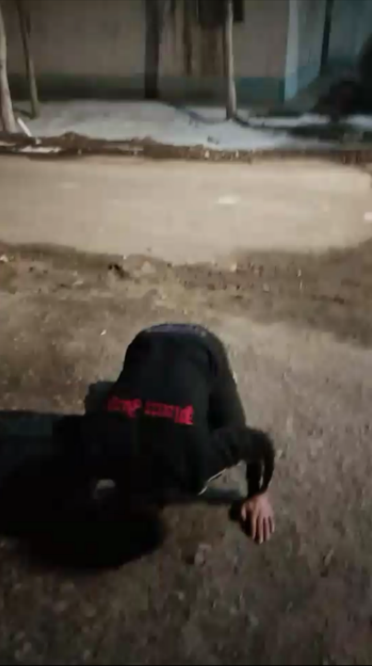
3. Video: “What should I do, bite into a building?
In this video, a young woman speaking Chinese chases after an elderly Uyghur man, asking him where he’s going and explaining that he is not allowed to go outdoors. He responds to her in Uyghur, saying, “What’s a person supposed to eat when they get hungry? What should I do, bite into a building?”
Analysis
Place of origin: Likely Aksu.
Time of creation: Approximately February 19 or 20. The video spread widely online among members of the Uyghur diaspora beginning on February 20 in the U.S.
Source: Likely recorded on a private telephone and distributed via social media.
Authentication: The clear point of the woman’s question is that the man should not be outside. In the current environment, this is most likely because local quarantines require people to stay inside their homes unless they have specific permission to leave. The Uyghur speaker’s accent is an Aksu accent, confirmed after review with multiple native speakers of Uyghur who were raised in or lived in Aksu. Details in the natural and built environment are consistent with streetscapes across the Uyghur Region.
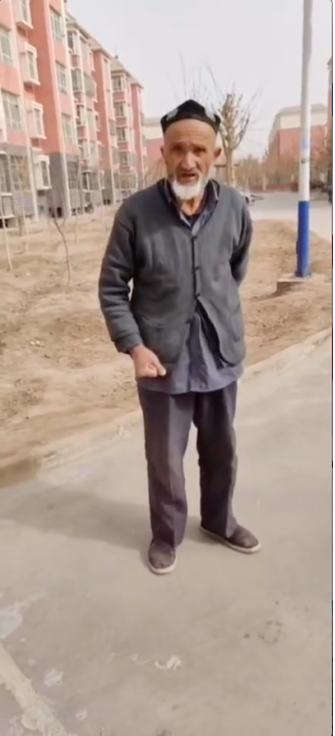

III. Corroborating Reports
Details in these and other pieces of evidence corroborate details from news reports published over recent weeks. Radio Free Asia’s Uyghur service, which has been at the forefront of reporting on the spread of COVID-19 in the region, reported in late January that officials in Atush erected six-foot-high metal fences to stop residents from moving outside their own neighborhoods. RFA also reported at the time that authorities told residents their quarantine would last until February 20 or so, several weeks in total. RFA’s reporting has also revealed that people with serious medical conditions are currently struggling due to a lack of access to the healthcare necessary to manage their conditions.
The measures by local authorities in the Uyghur Region echo measures Chinese authorities are taking in numerous localities in China. And the graveness of the situation is similar: RFA’s Mandarin service has also reported that authorities have recently discovered more than 500 casesof COVID-19 in prisons the Chinese provinces of Hubei, Zhejiang, and Shandong.
However, UHRP and other analysts remain concerned that the situation in East Turkistan, where the authorities are holding anywhere between 1 and 3 million internees and others in crowded, unsanitary camps and prisons, could be a breeding ground for the virus. Moreover, we are concerned that Uyghurs, Kazakhs, Kyrgyz, Huis, and other Turkic and Muslim peoples in East Turkistan are particularly vulnerable to ill treatment by authorities should they choose to disobey the authorities in search of food or medical treatment.

IV. Policy Recommendations
UHRP has been in contact with the U.S. Department of Health and Human Services, as well as with the World Health Organization and U.S. Secretary of State Mike Pompeo, to express our concern and urge U.S. government and multilateral action on this urgent, pressing issue.
UHRP further calls upon the Red Cross of China and the International Red Cross and Red Crescent to request access to the Uyghur Region, where they can conduct investigations into local conditions and provide humanitarian relief in the form of food, medicines, and other basic supplies.
In denying residents the rights to free movement, to food security, and to basic healthcare, COVID-19 quarantines are further endangering millions of lives in East Turkistan.
FEATURED VIDEO
Atrocities Against Women in East Turkistan: Uyghur Women and Religious Persecution
Watch UHRP's event marking International Women’s Day with a discussion highlighting ongoing atrocities against Uyghur and other Turkic women in East Turkistan.

